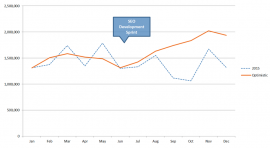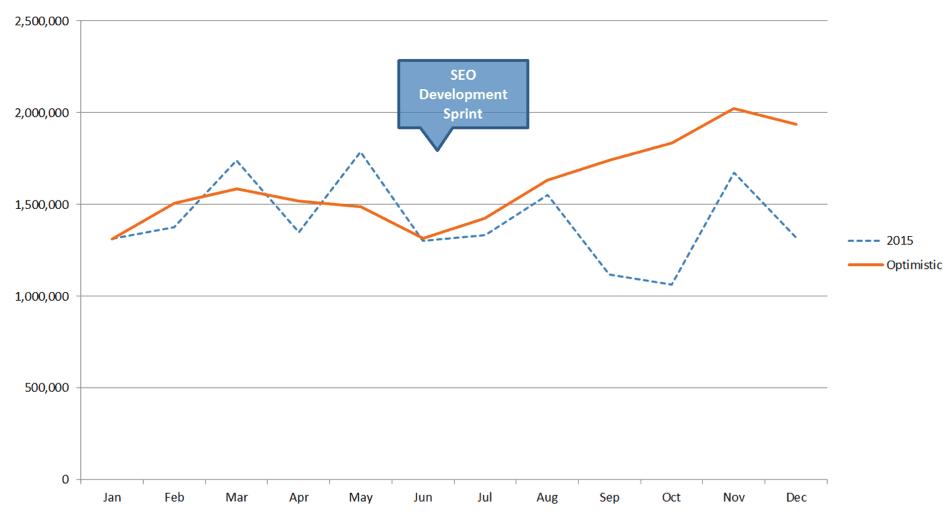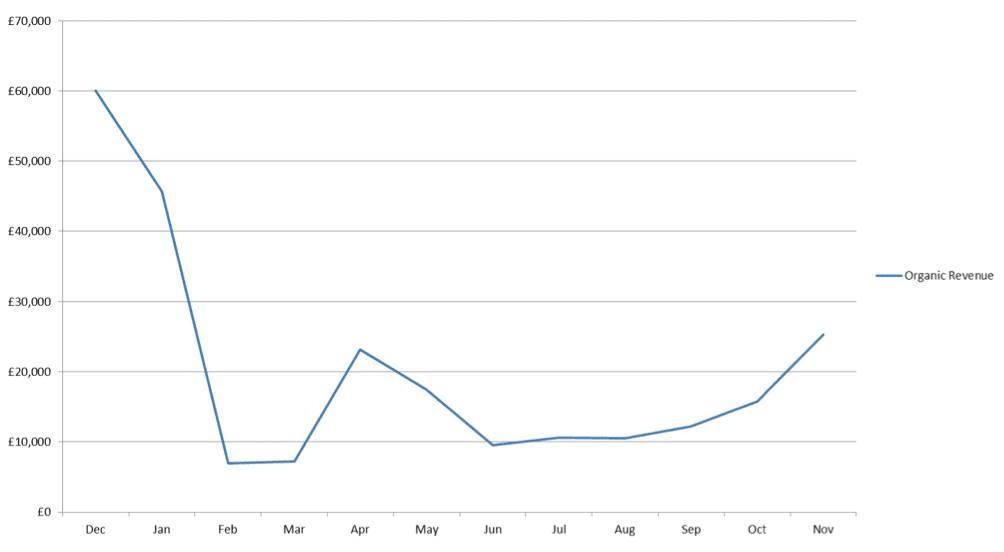SEO Forecasting – How to Calculate the Return of your SEO Activity?


The next best thing to an SEO crystal ball
Calculating return on SEO activity is a bit of a headache if we’re honest. With so many variables, how on earth do you confidently forecast what will happen? Forecasting anything is never going to be a simple black and white process, but compared to forecasting PPC, organic traffic is a real tough one to predict.
As SEO continues to establish itself as a credible marketing channel, forecasting is going to be a requirement that at some point we’re all going to face.
If you’re looking to sell big investments in SEO or gain new budget for your activity, I think it’s a pretty fair request to provide an understanding of what returns are available. That’s just good business sense / due diligence.
If you’ve never had to work on a forecast before but have suddenly been asked to do one (typically these requests come last minute too, just to add to the pressure!), then where do you start?
My method is to collect as much certainty as possible. At the very least, if you’re basing your projections on as much fact as you can get hold of, then you’ll be starting with a credible set of data behind what you’re predicting. In my mind, that’s pretty good place to begin.
Assess your current situation
Getting started means asking what data points you have access to, and then gathering your data accordingly.
As an example, you’ll probably want to consider looking for:
- Current organic traffic (and hopefully historic traffic data too)
- Search volume
- Seasonal changes in search volume
- Ranking data
- Conversion rates from organic search
- AOV
- CTRs (via search console or studies such as this and this)
With the above, you can start to build a fairly good picture of market size, your position within the organic marketplace, and what the commercial value of an increase in traffic might be.
The steps I take at this stage are:
Identify future likely causes of improvements
The lines start to get potentially blurred in this next phase – predicting how much improvement you’ll see following your proposed activity. Being too ambitious can carry a huge risk to the credibility of your forecast, so you need to be sensible.
From my experience, I’d say that presenting an unrealistic forecast carries far more risk to a successful pitch for budget than presenting a more pessimistic view would do.
Any increase must be believable and have a logical reason therefore, I’d always recommend not just siding with caution, but tying your improvements into specific events. You’ll also want to make sure these ‘events’ are backed up by data and relevant case studies where possible.
When starting to calculate potential improvements in organic traffic there’s a lot to consider, but I tend to at least think about the following points:
The list above is just a few of the main points you can tie future increases to. The main point is carefully considering scheduled work vs. improvements, rather than suggesting a blanket improvement with no real relationship to the work you’re proposing to complete.
Doing this also really helps to add clarity to the impact of delays on traffic increases. For example, if you’re forecasting an increase in traffic following the implementation of your SEO recommendations, it’s immediately clear to all that NOT implementing your changes will have a negative impact on forecasted growth.
Forecasting your improvements
Once you’ve worked out what future events within your proposed work are likely to have a positive impact on traffic, you can start to work out how much of a traffic increase you’re comfortable with forecasting.
Having previous experience goes a huge way here, as you’ll have a far better sense of what’s realistic. However, data should always form the basis of your forecast, with experience acting as an excellent bit of back-up to your calculations.
When forecasting the improvements, the following points are always on my list:
Once you’ve completed the steps above, you should have a forecasted growth in traffic that you feel comfortable with, but more importantly can be tied back to specific events and data points.
When you’re happy with your forecasted traffic increase, you can start to apply your conversion rates and AOVs to get a sense of what that traffic’s worth, and whether or not there’s a positive return to be had.
Given that SEO is a long game, it makes a lot of sense to forecast into year two where the positive return will really start to come into its own. That’s clearly quite a bit more work, but going that additional step at least at a high level, provides an excellent view on the longer term benefits.

Why do I like this method?
I like following this process because it means basing your forecast on data and specific events. In an area where forecasting has so many caveats it’s often seen as a ‘finger in the air’ activity, the more you can do to add credibility and logic to your forecast the better.
Hope this is useful and makes your next forecasting experience that little bit easier!
 Thanks to Jon Quinton for sharing their advice and opinions in this post. Jon is the Agency Director at Builtvisible You can follow him on Twitter or connect on LinkedIn.
Thanks to Jon Quinton for sharing their advice and opinions in this post. Jon is the Agency Director at Builtvisible You can follow him on Twitter or connect on LinkedIn.
From our sponsors: SEO Forecasting – How to Calculate the Return of your SEO Activity?



